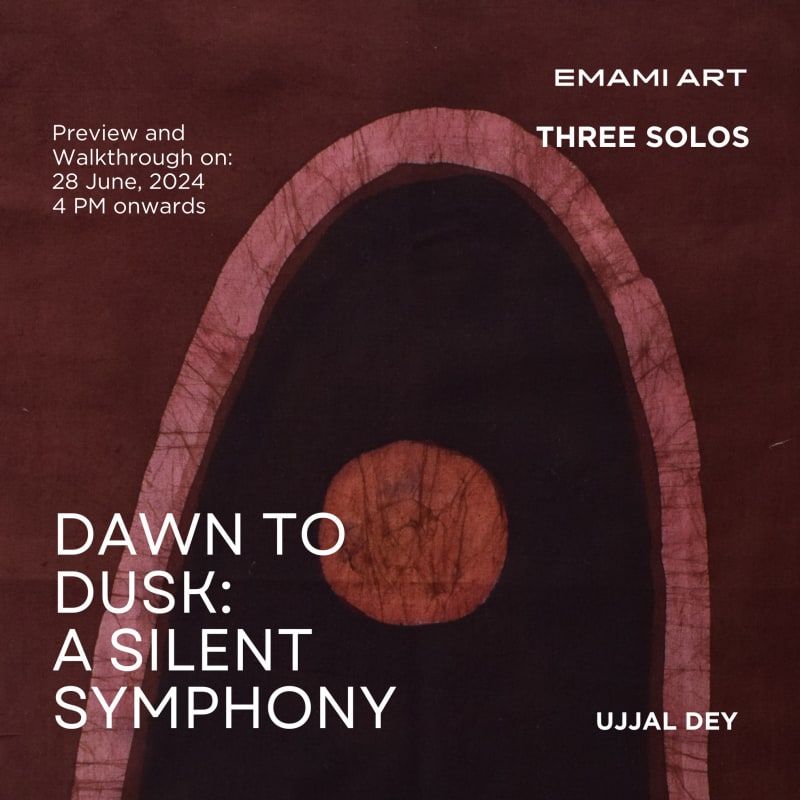Ujjal Dey’s recent works on textiles and paper are abstract and expressionistic meditations on themes of time’s passage, ritualistic practices, feminine labour and ties to nature. His keenly observant works, informed by extensive research on the textile histories of India, are a nuanced examination of pre-industrial age traditional dyes and socio-ecological considerations.
Dey’s processes and concepts highlight a profound and empathetic engagement with domesticity's physical, material, and symbolic dimensions while revealing a deep respect for preserving traditional practices within a contemporary artistic framework. Embracing repetition and chance, these works draw parallels on one hand to indigenous motifs and ancient hand-painted textiles like Andhra Pradesh’s medieval Kalamkari art, and on the other to his grandmother's rhythmic hand and needle movements while making Kanthas (Bengal quilts made from repurposed soft cotton cloths). Dey relentlessly performs synonymous patterns to symbolise daily monotony and psychological patterns, drawing attention to notions of lineal gendered labour.
Focusing on and integrating household cooking rituals such as grinding, washing, soaking, and cutting with his methodological framework of foraging, dye-making, and mordanting, Dey’s practice underscores the physicality of mundane domestic tasks. His artworks often bear imprints of common kitchen tools like the Shil-Nora (flat slab mortar & pestle) and Bonthi (traditional chopper), using pigments that he derives from these tools. This blend of culinary implements (historically crafted by men but primarily used by women) serving as both symbolic motif and technical medium, reflects ancestral knowledge of pigment extraction from South Asian bionetworks, while also demystifying societal oversight of unpaid household labour and celebrating women’s contributions in conventional, rural social structures.
Rooted in childhood memories, his images avoid simplistic symbolism, instead revealing the intricate tapestry of daily life. Mimicking the cyclicality of daily feminine chores within his social strata, his routine begins at dawn (Usha, 3-6 am), the final prahara of Ashtaprahara—an ancient Indic time scale dividing the day into eight segments. Dey’s rigorous process spans fifteen hours, paralleling rural women’s muscle memory of tasks and rituals from sunrise to sunset, perpetually resuming the subsequent morning.
Hence, the passage of time, the Sun, and the Moon are central to this exhibition. An important series, Offering to Surya, focuses on the Chhath Puja traditions of Northern-Eastern India and pays homage to his roots, capturing the rituals through visual storytelling. The large hanging textiles also epitomise the artistry of the Thekua (sweetmeat) mould makers who intricately carve wooden blocks to shape this traditional sweet as an offering to the Sun God. By using these blocks as printing apparatus, Dey draws parallels between tradition, ritual, and replication -- honouring cultural fidelity in rural households. Works like the Medoli series depict the daily ritualistic, performative, and auspicious 'Sun marks’. An age-old daily ritualistic practice, Medoli involves smearing cow dung and clay every dawn on earthen house floors. Dey takes cues from the gestural swabbing motion of the arms and augments the context by adding local clay in the Kalamkari ink and white clay (Khori maati) as a resist substancein the processes. The six works from Dey’s Mother and Child series are inspired by Shil-Shoshthi, an annual ritual offering to a regional goddess, Shoshthi, who is usually depicted holding an infant and considered a protector of children. Celebrated in spring primarily by women, all cooking is paused for the day, and the goddess is symbolised through the Shil-Nora. The artist uses this symbolism in his printmaking, weaving local religious-cultural heritage into a universal theme.
Dey has been experimenting with indigenous, traditional dyeing processes for more than nine years, and this exhibition posits his eco-laboratory as an immersive experience, featuring moulded block swatches on cloth and paper, alongside culinary tools employed in printing. Handmade traditional kalams, inks, and foraged dye extracts offer a glimpse into the artist’s conceptual framework. Through a process video, that merges his contemporary observations with childhood memories, Dey blurs temporal boundaries, inviting audiences into his artistic journey that traverses amid the personal and the collective.
Born into a Bengali family in Ranchi, Bihar, and currently based in Santiniketan, India, Ujjal Dey stands as both a contemporary textile artist and a dedicated researcher, weaving narratives that resonate with cultural heritage and personal introspection.
Chaiti Nath

